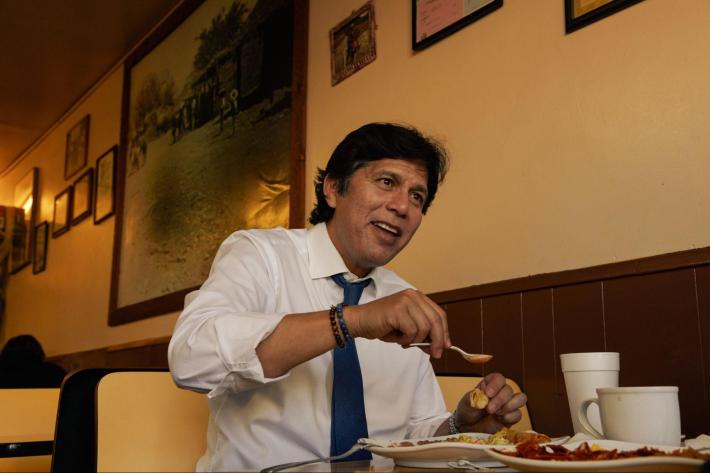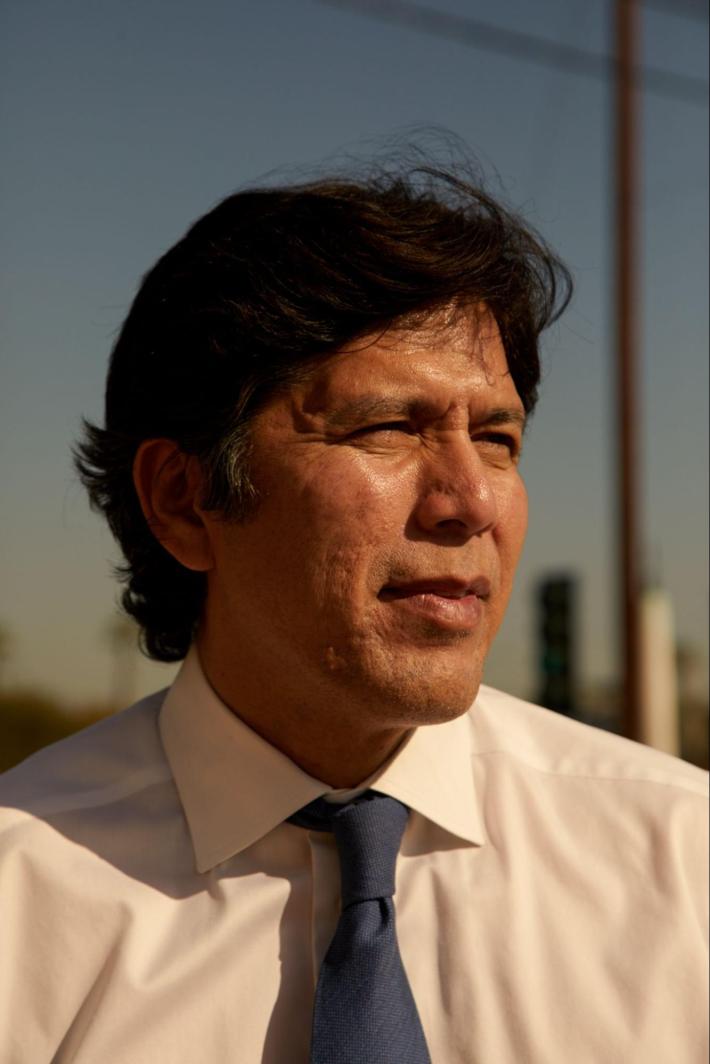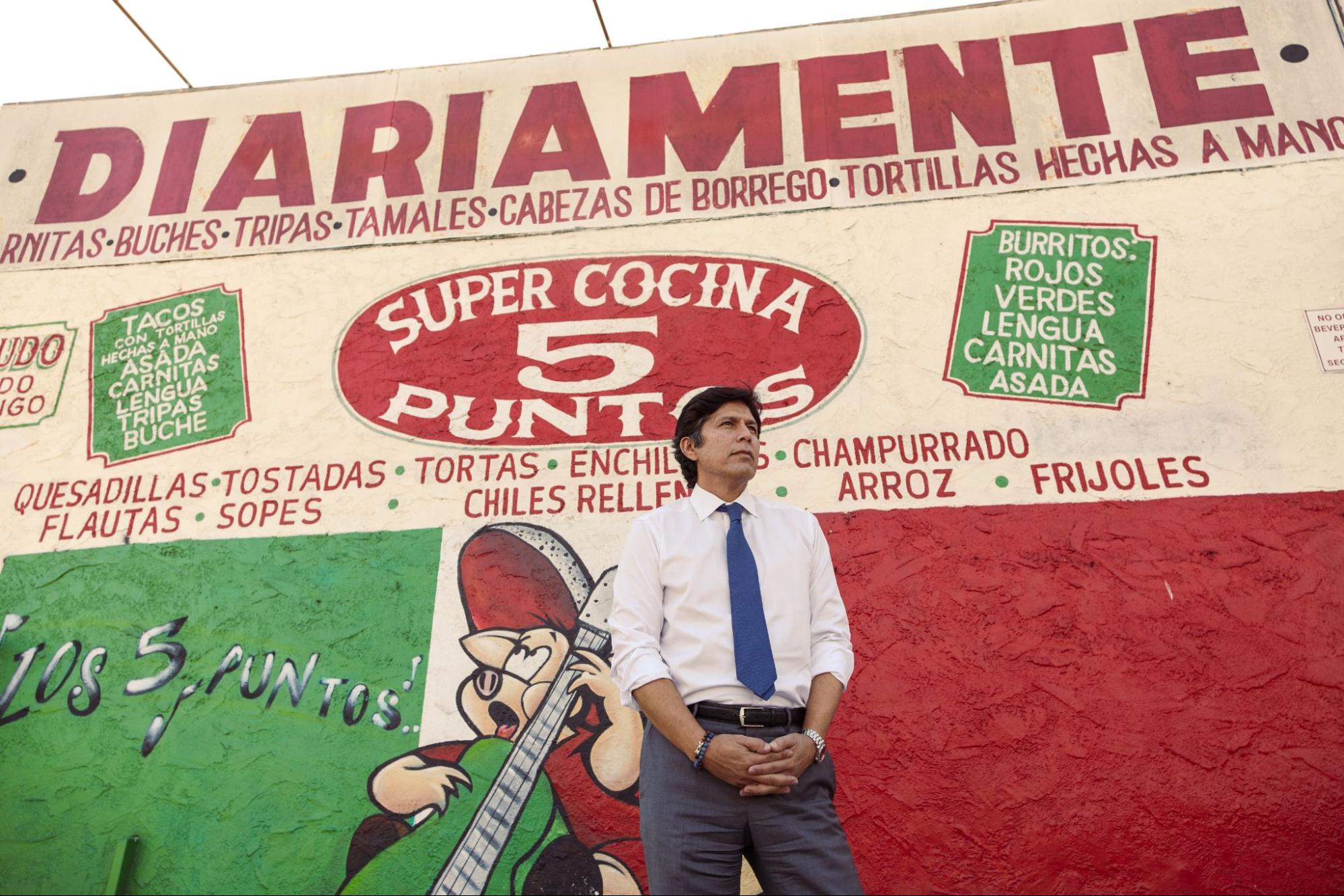Welcome to the mayoral candidate edition of L.A. TACO Votes! As L.A.’s primary election comes up in June, we will bring you street-level interviews and features with L.A.’s frontrunner mayoral candidates.
BOYLE HEIGHTS, LOS ANGELES - As a lawmaker, Los Angeles City Councilman Kevin De León has kept an eye on the bold and the specific ways his work can impact the most vulnerable. He is someone who sees the impact of a good headline but someone who also dares to take on the wonky policy proposals that hardly make the news. Born in downtown to a Guatemalan mother and Guatemalan-Chinese father, assembled in San Diego and across the state–Kevin De León has set a legacy of significant impact and hopes to continue doing so if elected as the next Mayor of the city of Los Angeles. The primary election for this race is in June. The goal? To make the top two candidates for the election in November and win.
At the start of the Trump administration, De León, then-President Pro-Tem of the California State Senate, pushed hard for California to be the first sanctuary state in U.S. history and won. In 2018, he ran against Senator Dianne Feinstein. Like many high-profile democrats across the state, running for this seat has become a rite of passage. If you win, you scale up in national presence the way now Vice President Kamala Harris did, or if you lose, you may disappear the way Congresswoman Loretta Sanchez has. But there is something about De León, who, despite losing the race in 2018, just two years late,r is now representing the city of Los Angeles’s most acclaimed and rapidly gentrifying district. Last fall, we sat down at Yeya’s Restaurant in Boyle Heights to talk about the development of his progressive politics, how his family shapes his policy priorities and this pivotal race in his career over some enchiladas and coffee.

In most of his early press to the moment we sat at Yeyas, De León has spoken honestly about dropping out of UC Santa Barbara, the pressure and shame he came home with–how facing his Mom at home, who relied on him to succeed has given him a form of courage.
Later, he’d finish his studies at one of the Claremont Colleges, legislate with the California Teachers Association, and potentially run for statewide office. On a visit to one of his tía’s house, he naively asked why she kept working late into her 60s, and as kindly as she could, she reminded him that she needed to pay the rent. De León realized that many undocumented people across the state don’t have a savings account as they grow older. So he campaigned and one SB 134, arguably the largest expansion of retirement security in the history United States of America since the creation of Social Security.
Early on in his political career, De León developed a coalition of “heavy hitters,” as said by Christine Chávez, the granddaughter of César Chávez, who he beat for the Assembly seat that would set the base for his career in Sacramento. Over ten years later, De León has continued his legacy of gathering the right people behind him, ruffling feathers of tradition, and never saying no to himself.
While the world erupts, this would be an excellent time to discuss who our upcoming mayor can be and how they are likely to improve or worsen people's lives in the city. Will our next mayor facilitate a conversation? Will they send a message to people fleeing their country that this is a city of immigrants and refugees?
In an era of post-pandemic, post-Trump, and renewed Obama-like neoliberal discourse, it can be easy to overlook the importance of the Mayor in Los Angeles and what their decisions will have in the daily lives of Angelenos. However, the importance and influence of the mayor depend on who they are. Throughout the last six years, we’ve seen mayors across the country use their position and power to improve the people's lives in their city.

The concept of states and local rights, a historically conservative political response to “big government,” was turned on its head in response to the Trump administration. Remember, when former President Donald Trump was inaugurated, a wave of sanctuary state resolutions and ordinances erupted from all over the country. State governors and city mayors proposed these. In Stockton, California, then-Mayor Michael Tubbs garnered national news for experimenting with a universal basic income program that gave a select number of Stockton residents $500 a month with no strings attached. A program that was criticized but worked. Maybe it reminds you of a program that sought to stimulate a national economy.
Boyle Heights, for decades, has become a political clout bubble in Los Angeles Latine/x politics. Fine-tuning your relationship to this part of town and acclaiming political power has a deep history in Los Angeles politics. With now over four tv shows set here, a corruption case of the last councilman, and the rapidly growing developments of the area, one straightforward question has bubbled for many from the area: Is Boyle Heights a home or a stepping stone?
However, as an electorate, what do we ask of candidates of color that we don’t ask of others? Running for mayor is not easy, and the same people who funded De León before support Congresswoman Karen Bass and vice-versa. So much of that discourse, however, can become inside baseball. Endorsements matter, but so do priorities and commitment.
While some neighboring homeowners who had just bought their two-bedroom single-family homes in Highland Park for $1 million took to online neighborhood apps and social media to voice their dismay about De León’s development, the fact was there: That would be 227 fewer people sleeping on a warm bed and not on the streets of Los Angeles.
Both candidates L.A. TACO has profiled were asked the same series of questions.
In a past televised debate, De León wasn’t afraid to say he has made the most impact than anyone on the stage argued has housed more people in his district and then some. His latest tiny home community by the 110 freeway in Highland Park provided 227 beds for the unhoused, one of which De León slept in himself to inaugurate the modest milestone. While some neighboring homeowners who had just bought their two-bedroom single-family homes in Highland Park for $1 million took to online neighborhood apps and social media to voice their dismay about De León’s development, the fact was there: That would be 227 fewer people sleeping on a warm bed and not on the streets of Los Angeles.
Meeting with De León at Yeya’s was smart. The cooks remembered him, and he only grew more frank as we talked. De León has a legacy of bold strides and no bullshit. The year ahead looks hopeful for him, but who else does he need to convince?
In 2022, it can be easy to see the protests for Prop 187 as an inspiring feat, but for then ESL teacher Kevin De León, they were the radicals to both conservatives and Democrats in the state. “We received a lot of criticism from Democrats,” he tells me, still intrigued. Whether it's organizing marches or supporting legislation that, to some, goes unnoticed, De León is ready to put the city on his back.







